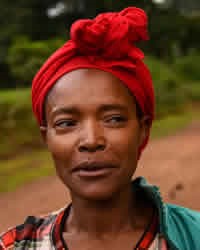Wolaitta in Ethiopia

Photo Source:
Rod Waddington - Flickr
Creative Commons
|
Send Joshua Project a map of this people group.
|
| People Name: | Wolaitta |
| Country: | Ethiopia |
| 10/40 Window: | Yes |
| Population: | 3,281,000 |
| World Population: | 3,281,000 |
| Primary Language: | Wolaytta |
| Primary Religion: | Christianity |
| Christian Adherents: | 98.00 % |
| Evangelicals: | 71.08 % |
| Scripture: | Complete Bible |
| Ministry Resources: | Yes |
| Jesus Film: | Yes |
| Audio Recordings: | Yes |
| People Cluster: | Omotic |
| Affinity Bloc: | Horn of Africa Peoples |
| Progress Level: |
|
Introduction / History
The Wolaita people are one of the indigenous people of Ethiopia who have their own culture, tradition, political legacy and kingdom. The Wolaita have about 200 clans which are divided in to two main tribes called Malla and Dogala. Historians classify this people as Omotic family which is one of the five language families in Ethiopia. This is because their settlement is parallel with the Omo River in the area. Wolaitas are one of Omotic language speaking people and their language is called also Wolaita (walaitato donna) by the name of the people.
Historically the Wolaita go back to the first century. There have been 42 dynasties ruling the Wolaita, beginning with Arujiya and extending to the Tigrean dynasty. In each dynasty not less than 500 to 600 years passed. When you calculate these years, Wolaita history may even extend to before Christ. There had been trade relation with Axum empires. It is a very wide and long history.
Where Are they Located?
The historical location of Wolaita is different from the current location, especially with regard to the coverage area. As some historians suggest, the administrative area of Wolaita extends up to Rudolf River in the south and North Shewa in the northern part of the current Ethiopia. Currently Wolaitas are located tin the southern part of Ethiopia with in the area of about 4,400 square kilo meters. The northern tip of the boundary of Wolaita is at about 360 km south from the capital Addis Ababa.
What Are Their Lives Like?
The Wolaita people are some of the poorest people in Ethiopia as well as in the entire world. The majority of the population lives in rural areas. Livelihoods of the same percent are based on agriculture (farming & animal rearing). The agricultural activities are practiced using archaic and backward hand tools. Land shortage (0.3 hectare per house hold), environmental degradation due to natural and man-made factors, loss of land fertility due to prolonged cultivation, are major problems among others that resulted in low agricultural productivity and yielding which has led to food deficiency. Nearly half the population suffers from food shortage. Per capita income is about $98 and much of the population is below poverty line. Low education coverage, poor health services, poor infrastructures development, lack of potable water supply, unfair distribution of resources by the central government are some problems among others that has caused this scenario.
What Are Their Beliefs?
Historically Wolaitas had their own traditional beliefs. In the periods from the end of the 19th century to the beginning of the 20th century King Menelike II of Ethiopia invaded Wolaita. At the time Wolaita was ruled by King Tona ,the last King of Wolaita Kingdom. There was a great humiliation during this time. King Menilike, with huge number of war lords and army conquered King Tona of Wolaita. After conquering them he started to forcefully convert Wolaitas in to Orthodox Christianity. Several decades later protestant missionaries come from abroad to the Wolaita and started to preach the gospel, built schools and health centers. As a result the people started to be converted to evangelical faith. Currently the majority of the people are Evangelical Protestant Christians, some are orthodox Christians and the rest are Muslims and other Christian denominations.
What Are Their Needs?
Material needs - Wolaitas need schools, health services, potable water supply, infrastructures not food but modern agricultural implements and inputs to improve food production.
Emotional needs - Wolaitas need justice, equality, fair distribution of resources and political and economical security.
Prayer Points
Wolaitas are God-fearing people. At the same time they are the poorest people. So we need prayer so that God may bless the people with prosperity.
Pray that their faith in God be strengthened because modernization has resulted in mind of secularity, and this has become a threat in that the people, especially the younger generation. There are many distractions and diversions from worshiping God and preaching the Gospel.